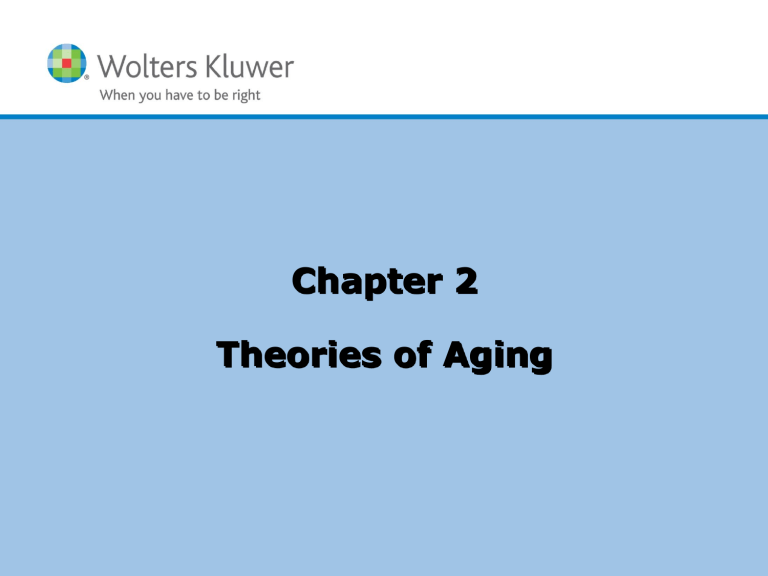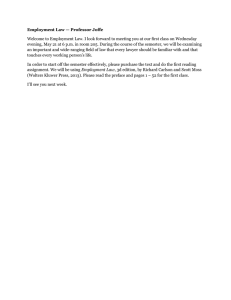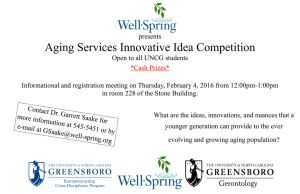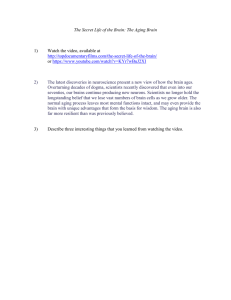
Chapter 2 Theories of Aging Copyright © 2022 Wolters Kluwer · All Rights Reserved Terms to Know Aging: the process of growing older that begins at birth Nonstochastic theories: explain biological aging as resulting from a complex, predetermined process Stochastic theories: view the effects of biological aging as resulting from random assaults from both the internal and external environment Copyright © 2022 Wolters Kluwer · All Rights Reserved Introduction No single known factor causes or prevents aging; no one theory can explain the complexities of aging. Theories of aging offer varying degrees of universality, validity, and reliability. Research efforts aim toward better understanding of aging process to guide health and postpone negative consequences. Copyright © 2022 Wolters Kluwer · All Rights Reserved Biological Theories of Aging Biological aging differs from species to species. No two individuals age identically. Theorists divide the many factors, both internal and external of human body, into two categories: o Stochastic: Random assaults from both internal and external environment over time o Nonstochastic: Complex, predetermined process Copyright © 2022 Wolters Kluwer · All Rights Reserved Stochastic Theories #1 Cross-linking theory o Cellular division is threatened as result of radiation or chemical reaction, creates cross-linking agent which interferes with normal process Free radicals and lipofuscin theories o Oxidative metabolism and effects of free radicals; damage and replace normal process o Lipofuscin accumulation leads to interference of normal process Wear and tear theories o Repetitive use, injury, stress results in breakdown of body; role of stress inconclusive Copyright © 2022 Wolters Kluwer · All Rights Reserved Stochastic Theories #2 Evolutionary theories o Mutation accumulation theory: declining force of natural selection with age o Antagonistic pleiotropy theory: accumulated mutant genes that have negative effects in late life may have beneficial effects in early life o Disposable soma theory: aging related to use of body’s energy rather than genetics Biogerontology o Pathogens may be responsible for certain physiologic changes during aging process Copyright © 2022 Wolters Kluwer · All Rights Reserved Nonstochastic Theories #1 Programmed/apoptosis o Programmed cell death that continuously occurs throughout life due to biochemical events Genetic theories o Programmed theory of aging: born with genetic program that predetermines life span o Error theory: genetic mutations cause organ decline as result of self-perpetuating cellular mutations o Others: failure to produce growth substance; production of aging factor; impaired cell function Copyright © 2022 Wolters Kluwer · All Rights Reserved Nonstochastic Theories #2 Autoimmune reactions o Changes in immune function with aging Neuroendocrine and neurochemical theories o Changes in brain and endocrine glands Radiation theories o Radiation may induce cellular mutations that promote aging. Copyright © 2022 Wolters Kluwer · All Rights Reserved Nonstochastic Theories #3 Nutrition theories o Good diet may minimize or eliminate some of the ill effects of aging process. Environmental theories o Ingestion of various substances, air pollutants, living conditions, high noise levels, etc., thought to influence how we age. Copyright © 2022 Wolters Kluwer · All Rights Reserved Question #1 Which statement best describes the autoimmune theory of aging? A. Genetic programs determine life expectancy. B. Cells undergo change, and the body identifies them as foreign. C. Organs decline as a result of cellular mutations. D. Failure of the production of a growth substance causes aging cells to die. Copyright © 2022 Wolters Kluwer · All Rights Reserved Answer to Question #1 B. Cells undergo change, and the body identifies them as foreign. Rationale: One hypothesis regarding the role of autoimmune reactions in the aging process is that the cells undergo changes with age, and the body misidentifies these aged, irregular cells as foreign agents and develops a plan to attack them. Copyright © 2022 Wolters Kluwer · All Rights Reserved Sociologic Theories of Aging #1 Disengagement theory o Process of gradual disengagement between society and individual; transfer of power from old to young; old released from societal role; theory discredited Activity theory o Older person should continue middle-aged lifestyle, denying existence of old age; society should not advocate diminishing activity, interest, and involvement as members grow old Copyright © 2022 Wolters Kluwer · All Rights Reserved Sociologic Theories of Aging #2 Continuity theory o Personality and basic patterns of behavior will remain unchanged as individual ages Subculture theory o Older adults are a group with distinct norms, beliefs, expectations, habits, and issues that separate them from rest of society Age stratification theory o Persons within similar age group generally have similar experiences, beliefs, attitudes, and life transitions that offer unique shared history Copyright © 2022 Wolters Kluwer · All Rights Reserved Question #2 Is the following statement true or false? The continuity theory of aging states that personality and basic patterns of behavior are said to remain unchanged as the individual ages. Copyright © 2022 Wolters Kluwer · All Rights Reserved Answer to Question #2 True Rationale: The continuity theory of aging relates personality and predisposition toward certain actions in old age to similar factors during other phases of the life cycle. For instance, activists at 20 years of age will most likely be activists at 70 years of age. Copyright © 2022 Wolters Kluwer · All Rights Reserved Psychological Theories of Aging #1 Developmental tasks o Challenges that must be met and adjustments that must be made in response to life experiences that are part of continued growth through life span Copyright © 2022 Wolters Kluwer · All Rights Reserved Psychological Theories of Aging #2 Developmental tasks o Erikson’s stages Stages Satisfactory Unsatisfactory Infancy Trust Mistrust Toddler Autonomy Shame Early childhood Initiative Guilt Middle childhood Industry Inferiority Adolescence Identity Identity diffusion Adulthood Intimacy Isolation Middle age Generativity Self-absorption Old age Integrity Despair Copyright © 2022 Wolters Kluwer · All Rights Reserved Psychological Theories of Aging #3 Developmental tasks (cont.) o Robert Peck Ego differentiation vs. role preoccupation Body transcendence vs. body preoccupation Ego transcendence vs. ego preoccupation o Robert Butler and Myrna Lewis Adjusting to one’s infirmities Developing sense of satisfaction with life lived Preparing for death Copyright © 2022 Wolters Kluwer · All Rights Reserved Psychological Theories of Aging #4 Gerotranscendence o Transition from rational, materialistic metaperspective to cosmic and transcendent vision o Desire to shed roles o Invest time in discovering hidden facets of oneself Copyright © 2022 Wolters Kluwer · All Rights Reserved Nursing Theories of Aging #1 Functional consequences theory o Promotion of wellness by addressing individuals holistically, recognizing interconnection of body, mind, and spirit; promote wellness and alleviate or reduce impact of negative factors, promoting positive functional consequences Theory of thriving o Everything that impacts people throughout their life must be linked to create a holistic view of aging; process of thriving is continuous and enables aging individuals to find meaning in life and adapt to changes Copyright © 2022 Wolters Kluwer · All Rights Reserved Nursing Theories of Aging #2 Theory of successful aging o Considers physical, mental, spiritual well-being, and self-appraisal; high level of personal control, positive affect, participation in health-promoting activities will result in greater life satisfaction Copyright © 2022 Wolters Kluwer · All Rights Reserved Applying Theories of Aging to Nursing Practice No single theory can adequately explain the aging process. Biological, psychological, and social processes of aging interrelated. Knowledge of all theories can guide nursing interventions to promote health and longevity. Factors that contribute to long and healthy life: diet, activity, play and laughter, faith, empowerment, stress management Nurses assist older adults in experiencing health, fulfillment, and sense of well-being Copyright © 2022 Wolters Kluwer · All Rights Reserved Question #3 Is the following statement true or false? The genetic theories of aging best describe how and why a person ages. Copyright © 2022 Wolters Kluwer · All Rights Reserved Answer to Question #3 False Rationale: No single factor causes or prevents aging; therefore, it is unrealistic to think that one theory can explain the complexities of the aging process. Copyright © 2022 Wolters Kluwer · All Rights Reserved






